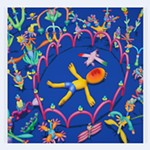Exhibitionism
Fri., Aug. 29, 1997
FLAME FAILURE, EPISODE 4: WAITING IN THE DARK
The Public Domain Gallery,
through June 29
Running Time: 40 min

Extended periods in the dark are unnerving. Even after your eyes adjust, you keep waiting for a dry, sinister hand to brush across your defenseless cheek while it searches for a vulnerable spot. Finally, it finds your ears and invades them with well-written words. But still you sit, in the dark, with only the words to guide you. However, in this latest installment of Flame Failure, an industrial espionage thriller in 12 episodes, the words aren't enough to get you through the darkness.
The Downstage Players, working out of the lower half of the Public Domain Theatre, have managed to uniquely transform this gallery with their healthy disregard for traditional uses of playing space, finding odd nooks to use as parts of the stage as well as interesting ways to light it, thanks to David Sebastian Boone's clever design. The transformation also affects the physical entrance to the space; the audience must be willing to traipse through an alley, past dumpsters and graffiti that help set the proper mood, in order to find entrance into Doc Recon's early-thrift store office.
Doc Recon himself, played by David Crawford, is an interesting character, a "doctor" who makes his living with experimental and illegal modifications on his clientele, a long list of assassins and spies who wander through his office, some searching for a prized book, others in need of Doc's medical prowess. Each character is more twisted than the last, and everything becomes a weapon in this powderkeg of a waiting room. Walter Clark as triple-agent Drake and Gay Gaughan-Hurst as cult-leader Wagner give strong and oddly touching performances despite the brutality surrounding them.
Partially, it is the sheer amount of choreographed combat in this episode that works against the development of the more intriguing aspects of the characters. Each section of dialogue seems only to set up the next fight while further muddying an already labyrinthine plot, a pity since writer/director Dan Bonfitto has already demonstrated his biting, intense style in the first three episodes. This episode, aptly subtitled Beyond Function, is trying too hard to review previous installments, explain the fate of a few characters, and set up Episode Five, Filter for Zeal, and it loses its cohesion and the main thread of an already complicated story. Plus, the infectious glee that ran through previous episodes is regrettably absent.
Still, there is nothing like the delightfully terrifying sensation of sitting in the dark, waiting for the shock of this serial's deceptive hand as it wraps around your neck or slides up your thigh. While this may not be its strongest appearance, next time its touch may be fatal. -- Adrienne Martini
PILL HILL: HEART TROUBLE
The Public Domain
through September 13
Running Time: 2 hrs, 30 min
Theatre is all about telling a story. Sure, there are always additional trappings, full of grandeur or self-reflection, but the play's story is the heart that pumps life through the limbs of the production. Sometimes that heart is an efficiently beating machine, keeping the blood circulating to every extremity, no matter how extreme or tangential. At other times, the pump gets clogged with too many unsupported ideas, causing it to push its themes in odd fits and never completed starts.
Samuel L. Kelley's Pill Hill is a big, vibrant heart that tells the story of six black steel mill workers in Chicago. Spanning 10 years starting in the early Seventies, the drama follows these men through many phases of life as they search for a path in a world without many options. Some of the men, like college-bound Ed, are successful despite the odds. Others, like mill-bound Joe, are trapped by their own inertia, too scared to see other choices.
First-time director Lisa Byrd has assembled a fine cast. Robert Pellette, Jr. gives a seemingly effortless performance as the rock-steady Charlie, while Vincent Woodard expertly plays the henpecked Al. Jerod Williams' Ed, the mill worker turned high-powered lawyer with a house on Pill Hill, Chicago's legendary upper-class black neighborhood, is likable but appears uncomfortable, much like the character himself. Christopher McCollum's set consists of a door covered by a simple backdrop of the Chicago skyline and, when coupled with Kari Perkins' modular costumes, both are tapped into Kelley's heart and receive its nourishment.
Unfortunately, some of the elements in this production have forgotten how to find this lush vein. The video and music segments that open each act -- a great but oddly executed idea -- seem an afterthought that isn't part of the flow of the story itself. Also, this production never quite finds its own rhythm and instead is constantly bounced around by dropped lines and forgotten blocking. Through this arrhythmia, it is difficult to tell which moments are supposed to be important and which drown the message with random noise.
Strength still lurks within the heart of this First Stage production. But it can't gush to the surface until all of the elements find their way to feed from the mighty pump of Kelley's story. -- Adrienne Martini
CURST & SHREWD: AN INVIGORATING CHAT
Hyde Park Theatre,
through September 6
Running time: 2 hrs, 20 min
Find a coffeehouse or a pub or maybe just a kitchen in which there's a fridge full of beer -- anywhere there might be a cluster of friends talking about some show they've all seen -- and listen. Listen to the free-form chatter: a river of reactions, pro and con, to the work as a whole and to a thousand of its aspects -- this performance, that performance, the writing, the lighting, the sound, the hair -- sometimes reasoned and respectful, sometimes rude and raving. Listen to the cascade of voices, speaking singly and in a noisy jumble, each with its own take on what's been seen, informed by the slightly different angle from which it was seen: the emotional, the moral, the sexual, the political, the experiential. Listen to the tumble of genial agreements, sharp dissents, flip quips, intimate observations, and unexpected insights that mark a lively conversation over a show.
In curst & Shrewd: The Taming of the Shrew Unhinged, that lively conversation is the show. The intrepid artists of Rude Mechanicals, led by director Shawn Sides, have crafted a performance piece out of their thoughts and feelings about one of William Shakespeare's most controversial plays. In 13 movements, they wander through the tale of Kate and Petruchio, occasionally performing snippets of the text but mostly commenting on it and what they take its themes to be through scholarly criticism, lines from other plays, slogans, news items, snatches of popular songs, excerpts from bestsellers and TV programs, video clips, choreographed routines, quotes from celebrities, friends, and relations, and, in what appear to be the show's most personal segments, individual monologues that draw parallels between experiences and issues in Shrew and their own and other's lives in the world.
Like the best conversations, the result is a brilliant mess. It's all over the map in terms of what is said and how it's said, roaming hither, yon, and back again in its content and forms of expression and tone. And since its approach to its subject is so fractured -- examining the play in bits and pieces, almost as if in an autopsy -- it loses something essential in our full experience of Shrew: the drama of the story being told when it's performed and mystery of these characters when they're fully realized. Still, for all its aimlessness and myopia, curst & Shrewd invigorates. It is intelligent and inventive, ranging over a deliriously broad range of source material, from Germaine Greer and Isaac Asimov to the Dixie Cups and WAR, from Punch and Judy to Stanley and Stella to George and Martha, from Funny Girl to Men Are From Mars/Women Are From Venus. Nothing is out of bounds and no one is afraid to speak her or his mind (a quality expressed with hilarious aplomb in Ehren Christian's arch deluxe account of a break-up at Trudy's). The show, which could easily mire itself in smothering self-righteousness, maintains an appealing humor throughout, even mocking its own attempts to control the direction of discourse. Most of all, it is clearly personal. In the monologues, in the committed delivery of the performed scenes, and in the eyes of the actors who engage the audience with their gazes, we can glean how much this material matters to these people. That makes it a conversation well worth entering into, and given the style and skill with which Rude Mechanicals conduct it, it's one I'd enter into again in a minute. -- Robert Faires








